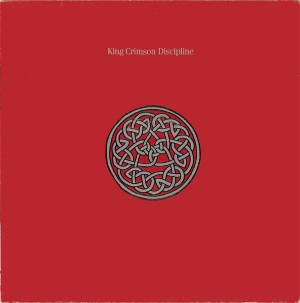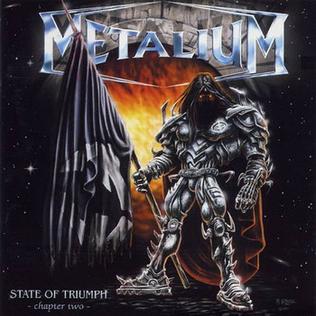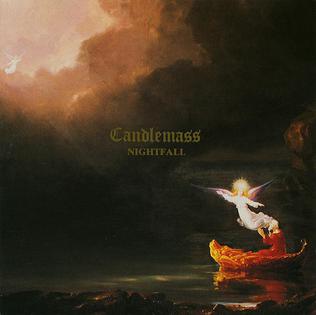After doing some current releases, I decided I wanted to kick back and check out some older albums. This one is all 80s, starting with some new-wave-y prog rock and following it up with a pair of epic metal releases. Here's what I've been checking out lately!
King Crimson - DisciplineAfter 7 years of silence, Robert Fripp starting rebuilding his music career. At first, he worked within the growing new wave space of the early 80s, then grabbed drummer Bill Bruford again for a new project that was going to be called Discipline. They brought in Tony Levin for bass and Andrew Belew of the Talking Heads to sing, write lyrics, and play guitar along with Fripp. The result is an interesting fusion of ideas, bringing over the 70s organized chaos the band was known for and meshing it with the more streamlined, new wave sound, making for quite a significant shift for the band.
I have to admit, this is still a pretty challenging listen, though. I did like the complex melodies of tracks like "Frame By Frame" and "Discipline." The way the guitars play off of each other is very fascinating. Fripp in particular really pushes his math rock muscles with some complicated fretwork, and Belew backs him up, either providing more rhythm, or getting some wild animal noises from his guitar. "Sheltering Sky" has a solid atmosphere, letting the solos just drift over it. However, there are times with the band gets back to the 70s jam-heavy style, particularly on "Indiscipline" and "Elephant Talk", ensuring that this is still Fripp and company. "Matte Kusadai" tries to be this proggy ballad, but doesn't really go anywhere, and the use of a frantic recording from Belew on "Thela Hun Ginjeet" makes the song hard to appreciate. Levin does give the piece a decent funky groove, though.
This album is definitely much more accessible than most anything they have done before. While there are plenty of proggy noodles and curious time signature shenanigans here and there, this album has a much stronger focus on organized song-writing and more repetitive and trancy segments. Between the math rock and ambient side, we get an album that shows that prog rock is not a dinosaur, but has potential to move forward in its own way. That being said, it's still a bit of a struggle for me to really appreciate overall, but I can't learn if I don't try.
Cirith Ungol - King of the DeadAfter doing this band's first album earlier this year, I thought I'd check out their critically acclaimed second album to see if they had improved. Right off, this one is much more consistent in quality and style, really settling into a unique metal sound. I know other folks have often called this album a staple of early power or doom metal, but honestly, I hear a lot of 70s influences. I know I mentioned early Rush in regards to the last album, and that tone is still there, but this one has some added power like classic Judas Priest, such as Sad Wings of Destiny or Sin After Sin. However, it does benefit from a heftier 80s production, letting these songs sound pretty big and crunchy.
Tim Baker continues his iconic, gritty wailing, giving the songs a lot of melodrama. He has a pretty epic scream towards the end of "King of the Dead" that stood out to me. "Finger of Scorn" had an interesting doomy vibe, with the acoustic sections, big riffs, and a punchy chorus. "Cirith Ungol" also brings the doom, with a long outro. I also liked "Master of the Pit," as it had a proggier vibe, starting and ending with long, noodly guitar solos. In fact, there's a lot of great solo work on this album, overall. The Bach cover is interesting, as they're using some kind of pedal to make their guitars sound a bit like an organ.
I don't know if I was completely enthralled by what I hear. The album has a bit of a lackluster start, and takes a while to really get going. Once it does, though, it settles into a nice, mid-tempo groove with a lot of atmosphere and great guitar work. This is definitely an improvement over their first, and certainly has some interesting, epic moments.
Dio - Dream EvilI'm surprised I haven't talked more about Dio's solo career, but it's another one I've been slowly working my way through. At this point, listening to any of Dio's stuff feels like it's more about the mystique of the man than the music itself, though he's certainly been responsible for many great songs. Dream Evil feels like a general continuation of what he had built with the previous three albums, with maybe an extra layer of polish.
At this point, the group brought in Craig Goldy on guitars and Claude Schnell on keyboards. While I don't know if I feel like the guitars are doing anything other than just being very 80s, the keyboards definitely feel stronger on this album, providing a lot of ambience and atmosphere that I don't exactly recall on the other albums. While synths aren't anything new for Dio, their prevalence on this album does kick it up a notch in the epicness department. Another thing I noticed this time was how each song's chorus is just basically repeating the title a lot. Again, not a new thing for Dio ("Rainbow in the Dark" comes to mind), but the fact that it happened on every track made me wonder if things weren't getting a little too formulaic. If there is a shift from previous albums, I think there's a greater emphasis on anthemic tones, designed for stadiums. I can easily see folks clapping and singing along to these quite easily.
That's not to say this is bad album, by any means. This is definitely stronger overall than their last one, Sacred Heart. "Dream Evil" is a very solid rocker, and "All the Fools Sailed Away" feels like a "Children of the Sea 2.0" and mostly works. I particularly liked the proggy shift about halfway through, topped with some nice solos. The rest are a bit of a mixed bag, but are mostly decent rock and metal numbers to support Dio's trademark vocals.
I admit things have gotten a little slow around here, lately. There are still a handful of 2021 releases I want to try and get to before the end of the year, and I've got one more anniversary article coming up that I need to decide what I'm doing with, so I'll probably have at least two more articles this month, but I'm thinking about focusing less on the videos and more on the reviews. While I do enjoy writing all these different articles, I certainly don't want them to become more work than they're worth. Hopefully, I can find a good balance going forward. Until then, rock on! \m/









